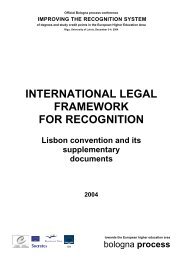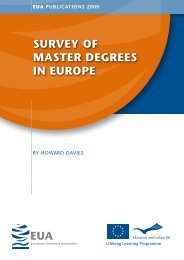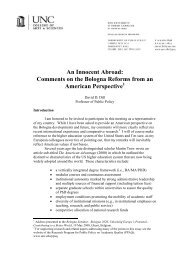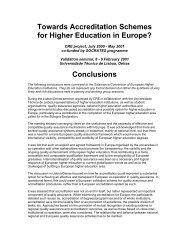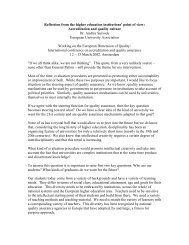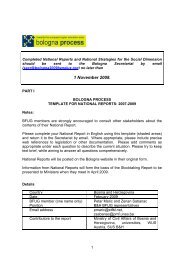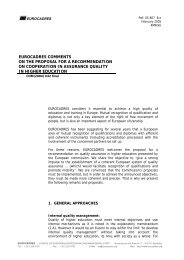BOLOGNA PROCESS - UK England, Wales & Northern Ireland
BOLOGNA PROCESS - UK England, Wales & Northern Ireland
BOLOGNA PROCESS - UK England, Wales & Northern Ireland
You also want an ePaper? Increase the reach of your titles
YUMPU automatically turns print PDFs into web optimized ePapers that Google loves.
4. Describe the structure which oversees the implementation of the Bologna Process in yourcountry.Please include:• the membership and role of any national Bologna group (for example policycommittee, promoters’ group)• the membership and role of students, staff trade unions, business and social partners inany national Bologna Group.The specific arrangements were set out in the previous national report, but institutional autonomymeans that implementation of the Bologna principles is primarily a matter for the sector itself.The <strong>UK</strong> HE Europe Unit’s two recent publications, Guide to the Diploma Supplement and UpdateGuide to the Bologna Process, make an important contribution to the implementation of Bolognareforms.In addition to the High Level Policy Forum and European Coordinating Group described in theprevious report, the National Union of Students, the national team of Bologna Promoters andprofessional bodies also participate and inform the policy position of the <strong>UK</strong> HE Europe Unit.Bologna Promoters have been active in the <strong>UK</strong> over the last two years and have assisted <strong>UK</strong>institutions on all aspects of the process.The <strong>UK</strong> has been providing the Bologna Secretariat since May 2005.5. Describe the arrangements for involving students and staff trade union/representativebodies in the governance of HEIs.Please include:• precise references (preferably with web links) to any legislation (or equivalent) in placeto ensure students and staff are represented on HEI governing bodies• the role of students in the governance of HEIs• the role of staff trade union/representative bodies in the governance of HEIs.In <strong>England</strong>, there are no legislative requirements for HEIs to have student and staff representativeson their governing bodies. However, the Committee of University Chairmen produces guidanceon good governance arrangements and recommends that governing bodies should include studentand staff members. All HEIs do have academic staff representatives on their governing bodies;some also have non-academic staff members. The vast majority of institutions have studentmembers on their governing bodies. Membership of the governing body will be laid down in theinstitution’s governing documents. Student and staff members are full members of the governingbody with full voting rights. The Higher Education Funding Council for <strong>England</strong> (HEFCE) Guidefor Members of Higher Education Governing Bodies in the <strong>UK</strong>(www.hefce.ac.uk/pubs/hefce/2004/04_40a ) encourages the adoption of open practices by governing bodies.HEFCE advises that staff and student representatives are fully involved in governing bodies and their expertise fullydrawn on. The inclusion of staff (and student) representatives in decision making adds considerably to the authorityand transparency of the decisions reached.6. Describe the measures in place to ensure the co-operation of business and social partnerswithin the Bologna Process.The Department for Education and Skills’ strategy is one of HE sector growth through employerledprovision. The HEFCE strategy on employer engagement(http://www.hefce.ac.uk/learning/employer/strat/) reflects this, defining ‘employer engagement’ interms of the broad range of collaborations existing between HE and public and private sectororganisations (as explored by the Lambert Report on Business-University Collaboration, 2003).The focus of this employer engagement strategy is on teaching and learning although it has links



